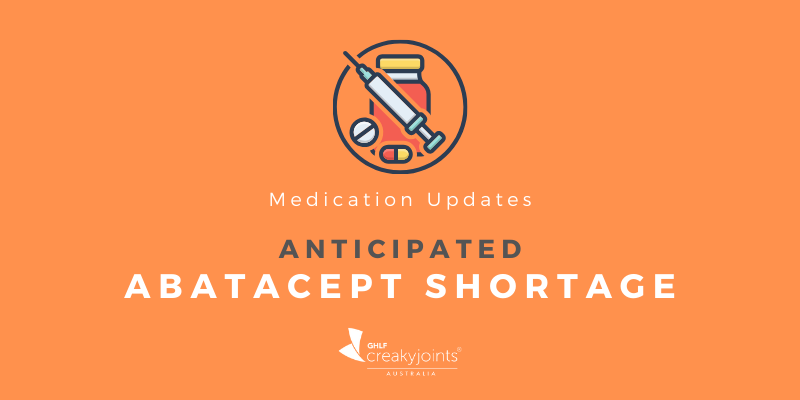AMA Family Doctor Week runs from Sunday 21 July to Saturday 27 July 2019. CreakyJoints Australia joins the Australian Medical Association (AMA) in celebrating the enormous contribution made by more than 30,000 GPs working around Australia.
During the event, the AMA will also call on the Government and policymakers to ensure general practice is strengthened and that Australia has an affordable and accessible health system for all into the decades ahead.
The theme for this year’s Family Doctor Week is Your family doctor and you: partnering for health. At CreakyJoints Australia, we believe partnering with your GP is one of the best ways to keep charge of your health.
The Role of the GP
General Practitioners (GPs) play a vital role as primary carers within the Australian Healthcare System. They are often the first port of call for people seeking medical treatment or health advice. They care for people of all ages and provide treatment and support across a vast range of areas, including:
- Treatment of everyday ailments, such as viruses and wounds.
- Diagnostic testing and analysis.
- Education about preventable conditions.
- Early intervention to decrease the impact of a condition.
- Management of chronic health conditions.
- Mental health management and support.
Many GPs are also family doctors, sometimes caring for several generations within one family. These long-term relationships help to build mutual knowledge, understanding and trust.
We’ve listed some of the best ways that GPs can help you manage your chronic illness.
1. Your GP Can be the Central Player in Your Team
When you live with a chronic condition, such as autoimmune arthritis, medical appointments often become part of your life. You may need to see a range of specialists and allied health professionals regularly.
For example, if you have ankylosing spondylitis you might see a rheumatologist, exercise physiologist, chiropractor, orthopaedic surgeon and a psychologist. Each may have differing views on the best way to manage your condition.
Melinda Bowd is an experienced nurse and the Victorian representative of the CreakyJoints Australia Patient Council. She is also the founder and administrator of the Australian Psoriatic Arthritis Warriors support group on Facebook.
As a chronic illness patient herself, Bowd understands the importance of having a trusted doctor to coordinate your care and keep communication flowing smoothly amongst your team.
“Having the one GP allows you to establish a relationship and build rapport with each other … they can become like your case manager.”
Bowd also believes a good relationship allows you each to know where the other stands on things, such as pain management approaches.
2. Your GP Tracks Your Progress
When all your referrals and tests are arranged by one GP, all your results and letters from specialists go back to that one source, Bowd says. Therefore, all your records are in one place and everything is documented. This helps you to keep track of allergies and medication changes. It may also spare you the cost of further tests as they can check your history for previous results.
Many GPs are now authorised to access the My Health Record platform. This is a cloud-based secure platform run by the Australian Government. It allows the electronic health records of your choice to be accessed by health professionals with your prior approval. Your doctor can help you decide how your My Health Record can be customised for your needs.
3. Your GP Knows What’s “Normal” for You
Chronic health conditions can be quite complex and symptoms can fluctuate wildly. A regular GP knows what your “normal” symptoms are and how you respond to them. For example, you may manage a certain level of pain well, so if you mention increased pain, they know to take you seriously.
As Bowd says, “A GP you don’t know won’t know these things about you, or what your ‘regular’ is to your ‘flare’. It’s these times you’re less likely to be heard — and less likely to be prescribed some of the heavier pain medications.”
4. Your GP Can Help You Access Extra Support From Medicare
To help you access the support you need, your GP can prepare a Chronic Disease Management Plan. There are two types of Medicare-funded plans in this scheme.
- GP Management Plans (GPMPs) are courses of action devised by you and your doctor to help you reach your healthcare goals.
- Team Care Arrangements allow your doctor to refer you to at least two other health professionals who will provide treatment or services to you.
If you are experiencing mental health issues such as anxiety or depression, your GP can also initiate a GP Mental Health Care Plan for you.
You will find information about these plans and more on our Government Support for People With Chronic Illness page.
5. Your GP is There to Help You
Before attending your GP, Bowd suggests you keep a list of any questions you may have, research you may have done that you’re wondering if you could do or try or any symptoms you want to discuss (especially new ones).
Bowd also says it is a good idea to have a monthly standing appointment with your doctor. This allows them to note any changes to your condition and respond to them early. It also means that you can discuss one or two issues at a time rather than trying to tackle many at once.
With your list handy, you won’t forget any questions in the pressure of a 10-minute appointment and you make the most of your time. If you don’t understand what your GP says, ask again until you do.
You can also ask them for a printout of information on new medications or diagnoses. They have all this at their fingertips.
Bowd’s biggest tip for those with chronic health issues is to remember that doctors are your employees. “You pay them for a service so make sure you are getting what you need.”
However, she also believes you need to know how to advocate for yourself. (She suggests you take someone with you to appointments if you need the support.)
“Learn about your illness and medications and have your questions at the ready. They (doctors) aren’t mind readers and not one of us is the same. You need to express your concerns and ask your questions to get the most out of the relationship and each appointment.”





